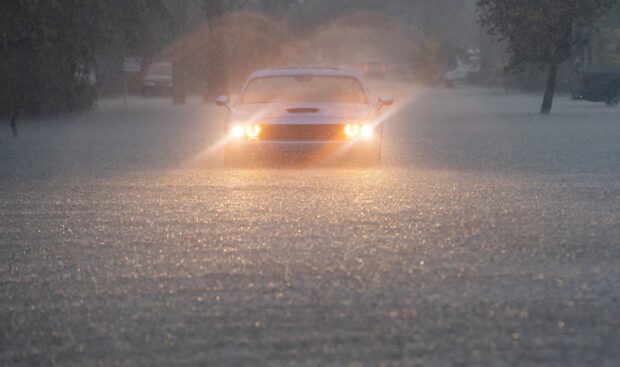Dangerous flooding from a tropical disturbance inundated much of southern Florida on Wednesday, blocking roads, floating vehicles and delaying the Florida Panthers on their way to Stanley Cup games in Canada against the Edmonton Oilers.
The disorganized storm system was pushing across Florida from the Gulf of Mexico at roughly the same time as the early June start of hurricane season, which this year is forecast to be among the most active in recent memory amid concerns that climate change is increasing storm intensity.
The disturbance has not reached cyclone status and was given only a slight chance to form into a tropical system once it emerges into the Atlantic Ocean after crossing Florida, according to the National Hurricane Center.
“Regardless of development, heavy rainfall is forecast to continue across portions of the Florida peninsula during the next few days,” the hurricane center posted on its website Wednesday.
Numerous roads were flooded and impassable for vehicles. On major artery Interstate 95 in Broward County, southbound traffic was being diverted around a flooded section and contractors were on their way to pump the drainage system, the Florida Highway Patrol said in an email. The interstate wouldn’t reopen until after water is drained, the agency said.
The Miami weather service office issued increasingly dire warnings.
“Life-threatening flooding is now ongoing,” the service said on the X social media platform. “Please stay off the roadways and get to higher ground.”
Mayors in Fort Lauderdale and Hollywood declared a state of emergency for their cities on Wednesday afternoon. Later Wednesday, Florida Gov. Ron DeSantis also declared a state of emergency for five counties — Broward and Miami-Dade on Florida’s Atlantic coast and Collier, Lee and Sarasota counties on the state’s west coast.
Miami-Dade County Mayor Daniella Levine Cava also issued a local state of emergency.
“Due to ongoing heavy rainfall, several roadways throughout the City of Fort Lauderdale, including major thoroughfares like Broward Boulevard and Federal Highway near downtown are experiencing high water levels,” Fort Lauderdale Mayor Dean Trantalis said on X.
In nearby Hollywood, Mike Viesel was driving home Wednesday afternoon with his dog Humi when he was caught in deep floodwater along a low-lying street, he told the Miami Herald.
As he slowed down and stopped, Viesel said other cars drove past him, sending even more water into his vehicle. His engine stalled.
“I’d walk out of my car,” he told the Herald, but his dog “has a problem with water.”
In Miami’s Edgewater neighborhood, the lobby of the building that Alfredo Rodriguez moved into a year ago already had water puddles inside on Wednesday morning. He told the Miami Herald the building has flooded five times since he moved in.
“It was a surprise to me. I want to leave this place in the next three months. This is horrible. I can’t pull my car around,” he said of the flooded streets.
Dozens of flights were delayed or canceled at Fort Lauderdale-Hollywood International Airport. The NHL’s Florida Panthers were delayed more than three hours from departing Fort Lauderdale for their nearly six-hour flight to Edmonton for Games 3 and 4 of the Stanley Cup Final.
Further north, the National Weather Service in Melbourne confirmed that an EF-1 tornado hit Hobe Sound on Florida’s Atlantic Coast north of West Palm Beach on Wednesday morning.
The winds knocked down multiple banyan trees and caused some damage to a store, Martin County Fire Rescue officials said. No injuries were reported, but access to wealthy Jupiter Island was cut off by debris on the road.
It’s already been a wet and blustery week in Florida. In Miami, about 6 inches (15 centimeters) of rain fell Tuesday and 7 inches (17 centimeters) in Miami Beach, according to the National Weather Service. Hollywood got about 5 inches (12 centimeters).
Bryan McNoldy, a senior research associate at the University of Miami Rosenstiel School, noted on X that some 9 inches (23 centimeters) had fallen on parts of South Florida from 7 a.m to 6 p.m. on Wednesday in addition to the rain that fell on Tuesday.
“We are in trouble,” McNoldy wrote.
More rain was forecast for the rest of the week, leading the weather service office in Miami to extend a flash flood watch through Thursday. Some places could see another 6 inches (15 centimeters) of rain.
The western side of the state, much of which has been in a prolonged drought, also got some major rainfall. Nearly 6.5 inches of rain fell Tuesday at Sarasota Bradenton International Airport, the weather service says, and flash flood warnings were in effect in those areas as well.
Forecasts predict an unusually busy hurricane season.
The National Oceanic and Atmospheric Administration estimates there is an 85% chance that the Atlantic hurricane season will be above average, predicting between 17 and 25 named storms in the coming months including up to 13 hurricanes and four major hurricanes. An average season has 14 named storms.
Fort Lauderdale was hit hard in April 2023 with record rainfall totals ranging from 15 inches (38 centimeters) to 26 inches (66 centimeters). Many homes and businesses were flooded.
Associated Press sports writer Stephen Whyno in Edmonton, Canada, and Freida Frisaro in Cooper City, Florida, contributed to this story.





















 How Americans Are Using AI at Work: Gallup Poll
How Americans Are Using AI at Work: Gallup Poll  Berkshire-owned Utility Urges Oregon Appeals Court to Limit Wildfire Damages
Berkshire-owned Utility Urges Oregon Appeals Court to Limit Wildfire Damages  Allianz Built an AI Agent to Train Claims Professionals in Virtual Reality
Allianz Built an AI Agent to Train Claims Professionals in Virtual Reality  AIG, Chubb Can’t Use ‘Bump-Up’ Provision in D&O Policy to Avoid Coverage
AIG, Chubb Can’t Use ‘Bump-Up’ Provision in D&O Policy to Avoid Coverage 